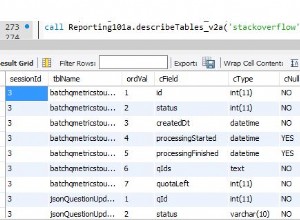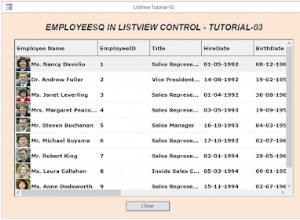एडेप्टर से जावा को कॉल करने की क्षमता आपके स्वयं के जेडीबीसी संग्रहित प्रो कार्यान्वयन को कॉल करने की क्षमता सहित लचीलेपन का एक बड़ा सौदा प्रदान करती है। इसका उपयोग करके हम संग्रहीत प्रोसेस को OUT SYS_REFCURSOR परिभाषित के साथ कॉल करने में सक्षम हैं और परिणाम को JSON के रूप में वापस सेट कर सकते हैं। आपके ऐप सर्वर (लिबर्टी, वेबस्फीयर, आदि..) पर एक jdbc डेटा स्रोत बनाने की आवश्यकता है। संग्रहीत प्रक्रिया को निष्पादित करने के लिए StoredProcedure java वर्ग में संदर्भित विधियों को देखें और डेटा को JSON के रूप में वापस प्राप्त करें। JSON सामग्री के लिए Apache dbutils और जैक्सन का उपयोग करता है।
CREATE PACKAGE "HR"."HR_DATA" IS -- Declare types, variables, constants, exceptions, cursors,
-- and subprograms that can be referenced from outside the package.
PROCEDURE "GETCURSORS" (
"DEP_ID" IN NUMBER,
"EMPLOYEES_C" OUT SYS_REFCURSOR,
"DEPENDENTS_C" OUT SYS_REFCURSOR);
END "HR_DATA";
एडेप्टर कोड:
function getEmployeesByDep(departmentId){
var storedProcedure = new Packages.com.samnunnally.dao.StoredProcedure();
storedProcedure.setDataSource("jdbc/hr_datasource");
storedProcedure.setStoredProcName("HR.HR_DATA");
storedProcedure.addParameter(0, departmentId, false);
storedProcedure.addOutParameter(1, Packages.oracle.jdbc.OracleTypes.CURSOR);
storedProcedure.addOutParameter(2, Packages.oracle.jdbc.OracleTypes.CURSOR);
var rsHandler = new Packages.org.apache.commons.dbutils.handlers.MapListHandler();
storedProcedure.execute(rsHandler);
return {
result :
{
EMPLOYEES : storedProcedure.getJsonParameterValue(1),
DEPENDENTS : storedProcedure.getJsonParameterValue(2)
}
};
}
जावा JDBC वर्ग:
package com.samnunnally.dao;
import java.io.IOException;
import java.sql.CallableStatement;
import java.sql.Connection;
import java.sql.ResultSet;
import java.sql.SQLException;
import java.sql.Types;
import java.util.ArrayList;
import javax.naming.Context;
import javax.naming.InitialContext;
import javax.naming.NamingException;
import javax.sql.DataSource;
import org.apache.commons.dbutils.ResultSetHandler;
import org.apache.commons.dbutils.handlers.KeyedHandler;
import org.codehaus.jackson.JsonGenerationException;
import org.codehaus.jackson.annotate.JsonProperty;
import org.codehaus.jackson.annotate.JsonRawValue;
import org.codehaus.jackson.map.JsonMappingException;
import org.codehaus.jackson.map.ObjectMapper;
/**
* @author Sam Nunnally
*
*/
public class StoredProcedure {
private String dataSource = "";
private String storedProcName = "";
private ArrayList<Parameter> parameters = null;
private Object resultSet = null;
private boolean autoCommit = true;
private final static String CALL_STRING = "{call ";
private final static String CALL_OPEN_PAREN = "(";
private final static String CALL_PARM = "?";
private final static String CALL_COMMA = ",";
private final static String CALL_CLOSE = ")}";
private class Parameter{
private int index = -1;
private boolean outParamter = false;
private Object value = null;
private Integer type = null;
/**
* @return the index
*/
public int getIndex() {
return index;
}
/**
* @param index the index to set
*/
public void setIndex(int index) {
this.index = index;
}
/**
* @return the outParamter
*/
public boolean isOutParamter() {
return outParamter;
}
/**
* @param outParamter the outParamter to set
*/
public void setOutParamter(boolean outParamter) {
this.outParamter = outParamter;
}
/**
* @return the value
*/
public Object getValue() {
return value;
}
/**
* @param value the value to set
*/
public void setValue(Object value) {
this.value = value;
}
/**
* @return the type
*/
public int getType() {
return type;
}
/**
* @param type the type to set
*/
public void setType(int type) {
this.type = type;
}
}
public void execute() throws NamingException, SQLException{
this.execute(new KeyedHandler<Object>());
}
public void execute(ResultSetHandler<?> rsHandler) throws NamingException, SQLException{
Connection connection = null;
try {
Context ctx = new InitialContext();
DataSource ds = (DataSource)ctx.lookup(dataSource);
connection = ds.getConnection();
connection.setAutoCommit(autoCommit);
String call = createCallString();
CallableStatement cs = connection.prepareCall(call);
int i=1;
for (Parameter p : this.getParameters()) {
if(p.isOutParamter()){
cs.registerOutParameter(i, p.getType());
}
else{
cs.setObject(i, p.getValue());
}
i++;
}
cs.execute();
i=1;
for (Parameter p : this.getParameters()) {
if(p.isOutParamter()){
if(p.getType() == -10/*oracle.jdbc.OracleTypes.CURSOR*/){
p.setValue(rsHandler.handle((ResultSet)cs.getObject(i)));
}
else{
p.setValue(cs.getObject(i));
}
}
i++;
}
/*
* Could do some BeanHandler implementation for <T> T
*
Class Summary
AbstractKeyedHandler<K,V> ResultSetHandler implementation that returns a Map.
AbstractListHandler<T> Abstract class that simplify development of ResultSetHandler classes that convert ResultSet into List.
ArrayHandler ResultSetHandler implementation that converts a ResultSet into an Object[].
ArrayListHandler ResultSetHandler implementation that converts the ResultSet into a List of Object[]s.
BeanHandler<T> ResultSetHandler implementation that converts the first ResultSet row into a JavaBean.
BeanListHandler<T> ResultSetHandler implementation that converts a ResultSet into a List of beans.
BeanMapHandler<K,V> ResultSetHandler implementation that returns a Map of Beans.
ColumnListHandler<T> ResultSetHandler implementation that converts one ResultSet column into a List of Objects.
KeyedHandler<K> ResultSetHandler implementation that returns a Map of Maps.
MapHandler ResultSetHandler implementation that converts the first ResultSet row into a Map.
MapListHandler ResultSetHandler implementation that converts a ResultSet into a List of Maps.
ScalarHandler<T> ResultSetHandler implementation that converts one ResultSet column into an Object.
*/
ResultSet rs = cs.getResultSet();
if(rs != null){
resultSet = rsHandler.handle(rs);
}
}
finally{
if(connection != null){
connection.close();
}
}
}
private String createCallString(){
StringBuffer sb = new StringBuffer();
int parmCnt = this.getParameters().size();
sb.append(CALL_STRING)
.append(storedProcName)
.append(CALL_OPEN_PAREN);
for(int i = 0;i<parmCnt;i++){
sb.append(CALL_PARM);
if(parmCnt > i + 1){
sb.append(CALL_COMMA);
}
}
sb.append(CALL_CLOSE);
return sb.toString();
}
/**
* @return the dataSource
*/
public String getDataSource() {
return dataSource;
}
/**
* @param dataSource the dataSource to set
*/
public void setDataSource(final String dataSource) {
this.dataSource = dataSource;
}
/**
* @return the storedProc
*/
public String getStoredProcName() {
return storedProcName;
}
/**
* @param storedProc the storedProc to set
*/
public void setStoredProcName(final String storedProcName) {
this.storedProcName = storedProcName;
}
/**
* @return the autoCommit
*/
public boolean isAutoCommit() {
return autoCommit;
}
/**
* @param autoCommit the autoCommit to set
*/
public void setAutoCommit(boolean autoCommit) {
this.autoCommit = autoCommit;
}
/**
* @return the resultSet
*/
public Object getResultSet() {
return resultSet;
}
/**
* @return the parameters
*/
private ArrayList<Parameter> getParameters() {
if(parameters == null){
parameters = new ArrayList<StoredProcedure.Parameter>();
}
return parameters;
}
/**
* @param index - the first parameter is 0, the second is 1, and so on
* @param value
* @param isOutParam
*/
public void addParameter(int index, Object value, boolean isOutParam){
Parameter p = new Parameter();
p.setIndex(index);
p.setValue(value);
p.setOutParamter(isOutParam);
p.setType(determineSqlType(value));
this.getParameters().add(index, p);
}
/**
* @param index - the first parameter is 0, the second is 1, and so on
* @param type - java.sql.Types int value of the parameter
*/
public void addOutParameter(int index, int type){
Parameter p = new Parameter();
p.setIndex(index);
p.setType(type);
p.setOutParamter(true);
this.getParameters().add(index, p);
}
/**
* @param index - the first parameter is 0, the second is 1, and so on
* @param type - java.sql.Types value of the parameter
*/
public void addOutParameter(int index, Object type){
Parameter p = new Parameter();
p.setIndex(index);
p.setType((int)type);
p.setOutParamter(true);
this.getParameters().add(index, p);
}
public Object getParameter(int index){
return this.getParameters().get(index);
}
@JsonProperty("raw")
@JsonRawValue
public String getJsonResultSet() throws JsonGenerationException, JsonMappingException, IOException{
String result = "{}";
if(this.getResultSet() != null){
ObjectMapper mapper = new ObjectMapper();
result = mapper.writeValueAsString(this.getResultSet());
}
return result;
}
@JsonProperty("raw")
@JsonRawValue
public String getJsonParameterValue(int index) throws JsonGenerationException, JsonMappingException, IOException{
String result = "{}";
Parameter parm = this.getParameters().get(index);
if(parm != null && parm.getValue() != null){
ObjectMapper mapper = new ObjectMapper();
result = mapper.writeValueAsString(parm.getValue());
}
return result;
}
/**
*
* Determines SqlType of object. throws exception if unknown
*
* NOTE: this is not meant to be a complete list, just picked most
* common types to start with.
*
* @param obj
*
* @return $returnType
*
*/
public static int determineSqlType(Object obj) {
int sqlType = Types.VARCHAR;
if (obj == null) {
// assuming a string if object is null
sqlType = Types.VARCHAR;
} else if (obj instanceof java.lang.String) {
sqlType = Types.VARCHAR;
} else if (obj instanceof java.lang.Integer) {
sqlType = Types.INTEGER;
} else if (obj instanceof java.lang.Double) {
sqlType = Types.DOUBLE;
} else if (obj instanceof java.lang.Float) {
sqlType = Types.FLOAT;
} else if (obj instanceof java.io.InputStream) {
sqlType = Types.LONGVARBINARY;
} else if (obj instanceof java.math.BigDecimal) {
sqlType = Types.DECIMAL;
} else if (obj instanceof java.math.BigInteger) {
sqlType = Types.BIGINT;
} else if (obj instanceof java.util.Date) {
sqlType = Types.DATE;
} else if (obj instanceof java.sql.Date) {
sqlType = Types.DATE;
} else if (obj instanceof java.sql.Timestamp) {
sqlType = Types.TIMESTAMP;
} else if (obj instanceof java.sql.ResultSet) {
//oracle.jdbc.OracleTypes.CURSOR
sqlType = -10;
} else if (obj instanceof java.sql.Blob) {
sqlType = Types.BLOB;
} else if (obj instanceof java.sql.Clob) {
sqlType = Types.CLOB;
} else {
sqlType = Types.OTHER;
}
return sqlType;
}
}




